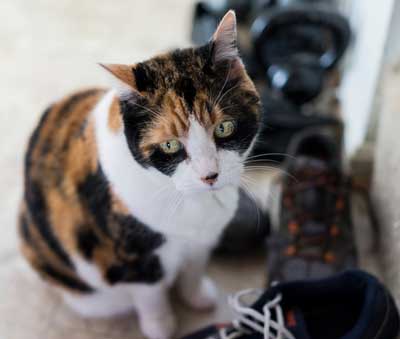Does Your Cat Have Separation Anxiety?

Separation anxiety is something that is discussed a lot in relation to dogs. They tend to destroy the house or bark incessantly when they are affected by it. Cats often have more subtle signs, but they can suffer from separation anxiety, too.
Signs of Separation Anxiety in Cats
Here are some of the signs that your cat might show if he is suffering from separation anxiety when you're gone:
- Inappropriate urination
- Inappropriate scratching
- Yowling while you're gone
- Fighting with other cats in the home
- Over-grooming
Diagnosis of Feline Separation Anxiety
These signs can all be due to conditions other than separation anxiety, too. If your cat is showing any or all of these signs, the first step is to visit the veterinarian, who will do a thorough physical examination, take a history from you, and perform some diagnostics to rule out medical issues for the behavior(s).
Once medical issues are ruled out, you and your veterinarian can determine that separation anxiety is the most likely cause of the behavior.
Treatment of Separation Anxiety in Cats
Sometimes medications are used in cats to calm them and help them better cope with their human being gone. However, these drugs all carry potential side effects and don't get to the root of the problem. It may be appropriate to use them short-term while you implement behavior modification techniques; your veterinarian is best-suited to help you decide this. Remember, never give your cat any medications on your own; many drugs are toxic to cats or require strict dosing. Your veterinarian must always be involved in medication decisions for your cat.
Here are some behavior modification techniques to implement if your cat is suffering from separation anxiety:
- Environmental enrichment. Be sure you are leaving your cat with things to do while you're gone. Use puzzle toys to keep your kitty busy while you're gone. Place a scratching post near a window with a bird feeder outside to keep him entertained. Give him a cat cave to provide a hiding spot, and be sure to have high perches available, which help calm cats.
- Maintain a schedule as much as possible. Cats with anxiety can feel worse when they don't know what to expect. As much as possible, maintain a consistent schedule of your comings and goings, feedings, and playtimes, so your cat knows what to expect when.
- Use a Feliway diffuser. Feliway is a chemical that mimics the cat calming pheromone that mother cats emit to keep their kittens peaceful. Use a diffuser to help your cat stay calm while you're gone.
-
Keep special toys hidden until you're leaving. Keep some entertaining cat toys on hand, but don't let your cat have them all the time. Bring them out when you leave to keep your cat busy while you're gone. An automatic toy with a "play while you're away" function can be a great thing to set up for while you're gone, too.
- Use a product that allows you to interact with your cat while you're gone. PetChatz is a great way to stay in touch with a cat that suffers from separation anxiety. You can set it up, connect it to your Wi-Fi, and call your cat whenever you want. Your cat will come over to see you, and you can even dispense a treat for him.
If your cat has separation anxiety, the best thing you can do is give him positive outlets so he can feel better; use patience, kindness, and understanding to help your cat, who is suffering when you're gone.
You can learn more here: "Feline Separation Anxiety."
You May Also Like These Articles:
Common Cat Behavior Problems and How to Solve Them: Slideshow
Cat Not Using Litter Box? Inappropriate Urination in Cats
Notice: Ask-a-Vet is an affiliated service for those who wish to speak with a veterinary professional about their pet's specific condition. Initially, a bot will ask questions to determine the general nature of your concern. Then, you will be transferred to a human. There is a charge for the service if you choose to connect to a veterinarian. Ask-a-Vet is not manned by the staff or owners of CatHealth.com, and the advice given should not delay or replace a visit to your veterinarian.





